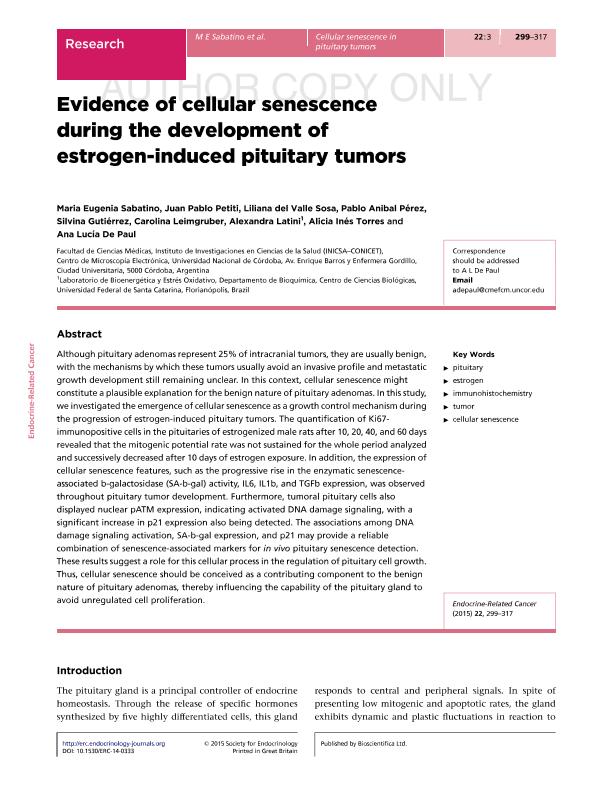Artículo
Evidence of cellular senescence during the development of estrogen-induced pituitary tumors
Sabatino, María Eugenia ; Petiti, Juan Pablo
; Petiti, Juan Pablo ; Sosa, Liliana del Valle
; Sosa, Liliana del Valle ; Pérez, Pablo Aníbal
; Pérez, Pablo Aníbal ; Gutiérrez, Silvina
; Gutiérrez, Silvina ; Leimgruber, Carolina
; Leimgruber, Carolina ; Latini, Alexandra; Torres, Alicia Ines
; Latini, Alexandra; Torres, Alicia Ines ; de Paul, Ana Lucia
; de Paul, Ana Lucia
 ; Petiti, Juan Pablo
; Petiti, Juan Pablo ; Sosa, Liliana del Valle
; Sosa, Liliana del Valle ; Pérez, Pablo Aníbal
; Pérez, Pablo Aníbal ; Gutiérrez, Silvina
; Gutiérrez, Silvina ; Leimgruber, Carolina
; Leimgruber, Carolina ; Latini, Alexandra; Torres, Alicia Ines
; Latini, Alexandra; Torres, Alicia Ines ; de Paul, Ana Lucia
; de Paul, Ana Lucia
Fecha de publicación:
03/2015
Editorial:
BioScientifica
Revista:
Endocrine - Related Cancer
ISSN:
1351-0088
e-ISSN:
1479-6821
Idioma:
Inglés
Tipo de recurso:
Artículo publicado
Clasificación temática:
Resumen
Although pituitary adenomas represent 25% of intracranial tumors, they are usually benign, with the mechanisms by which these tumors usually avoid an invasive profile and metastatic growth development still remaining unclear. In this context, cellular senescence might constitute a plausible explanation for the benign nature of pituitary adenomas. In this study, we investigated the emergence of cellular senescence as a growth control mechanism during the progression of estrogen-induced pituitary tumors. The quantification of Ki67- immunopositive cells in the pituitaries of estrogenized male rats after 10, 20, 40, and 60 days revealed that the mitogenic potential rate was not sustained for the whole period analyzed and successively decreased after 10 days of estrogen exposure. In addition, the expression of cellular senescence features, such as the progressive rise in the enzymatic senescence-associated b-galactosidase (SA-b-gal) activity, IL6, IL1b, and TGFb expression, was observed throughout pituitary tumor development. Furthermore, tumoral pituitary cells also displayed nuclear pATM expression, indicating activated DNA damage signaling, with a significant increase in p21 expression also being detected. The associations among DNA damage signaling activation, SA-b-gal expression, and p21 may provide a reliable combination of senescence-associated markers for in vivo pituitary senescence detection. These results suggest a role for this cellular process in the regulation of pituitary cell growth. Thus, cellular senescence should be conceived as a contributing component to the benign nature of pituitary adenomas, thereby influencing the capability of the pituitary gland to avoid unregulated cell proliferation.
Palabras clave:
Cellular Senescence
,
Estrogen
,
Immunohistochemistry
,
Pituitary
,
Tumor
Archivos asociados
Licencia
Identificadores
Colecciones
Articulos(INICSA)
Articulos de INSTITUTO DE INVESTIGACIONES EN CIENCIAS DE LA SALUD
Articulos de INSTITUTO DE INVESTIGACIONES EN CIENCIAS DE LA SALUD
Citación
Sabatino, María Eugenia; Petiti, Juan Pablo; Sosa, Liliana del Valle; Pérez, Pablo Aníbal; Gutiérrez, Silvina; et al.; Evidence of cellular senescence during the development of estrogen-induced pituitary tumors; BioScientifica; Endocrine - Related Cancer; 22; 3; 3-2015; 299-317
Compartir
Altmétricas



